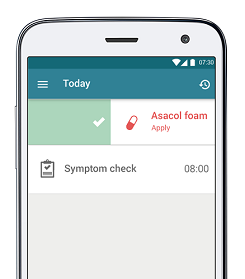Reaching Remission: Manage a Flare-Up of Symptoms with a Smartphone Health App
Do You Have Ulcerative Colitis? Despite Your Symptoms, You Can Still Live a Healthy, Active Life by Taking Medication Regularly and Monitoring Your Health Carefully

Ulcerative colitis is a chronic medical condition that causes inflammation and ulceration of the inner lining of the colon and the rectum. It is one of the two main forms of inflammatory bowel disease (the other is Crohn’s disease) and leads to ulcers and bleeding. While there is currently no cure for the condition, it is possible to manage the symptoms effectively and maintain periods of remission with medication. Although taking medication may sound like a simple task, adherence in today’s busy, fast-paced world can be challenging. Medication reminder apps can therefore offer invaluable support in this area.
The medication reminder and health tracker app MyTherapy is tailored to the needs of patients with chronic illnesses like ulcerative colitis. The app generates medication reminders via an alarm and pop-up notifications, reminding you, the patient, when and what dosages to take. All you have to do is scan the barcode of the medication package or use the app’s built-in medication database and then choose the time when the medication must be taken as per prescribed instructions from a healthcare professional. Times can easily be adjusted and changed for weekends, meaning that the app is designed to fit your lifestyle. These reminders turn the everyday challenge of adhering to medication into a simple to-do list.
In addition to these reminders, MyTherapy also comes with a built-in health diary. With this you can easily track your symptoms and health measurements such as weight, diet, and bowel movements. The health diary, which can be shared with your doctor, gives you a reliable overview of how you are doing and progressing with treatment. This can help you and your doctor identify when and how flare-ups occur and can be used to adjust your treatment plan to reduce symptoms as much as possible.
MyTherapy is constantly being developed via user-feedback, meaning that the app consistently remains easy-to-understand and simple-to-use. Any person of any age with ulcerative colitis can therefore use the app. With its user-friendly layout, reliable reminder function, the health diary, and various additional features, MyTherapy can be a valuable companion to anyone living with ulcerative colitis. Have peace of mind about your health and use MyTherapy to simplify the everyday task of taking medication and tracking your health.
Ulcerative Colitis: The Ins and Outs
Together with Crohn’s disease, ulcerative colitis is a chronic type of inflammatory bowel disease. It occurs when the lining of the large intestine (colon) and the rectum become inflamed. The inflammation usually affects the lower colon but may affect the entire colon too. If ulcerative colitis only affects the rectum, it is referred to as proctitis, and if it affects the whole colon, it may be called total colitis or pancolitis. With this condition, ulcers develop on the surface of the lining and these can bleed and produce mucus. Furthermore, the inflammation means that the bowel moves and empties its contents more frequently. Approximately one in 420 people in the UK are affected by ulcerative colitis and it can begin at any age (although it is most often diagnosed in people between the ages of 15 and 25 years).
Remission and relapses
Ulcerative colitis is an individual condition, meaning that it varies from person to person. The main symptoms, however, include:
- Diarrhea
- Blood, mucus, or pus in stool
- The need to empty the bowels more frequently
- Abdominal and rectal pain
- Fever
- Weight loss
- Malnutrition
In addition to these symptoms, it is possible that people with ulcerative colitis will develop joint pain, joint swelling, and skin ulcers and experience nausea and vomiting. The condition can also be asymptomatic or only present very mild symptoms for weeks or months at a time. These periods are known as remission. Some people remain well for a long time while others may have frequent flare-ups.
If you experience any of these symptoms, it is important that you see your doctor as soon as possible. He or she will do a physical examination, ask about your medical history, and arrange various blood or stool tests. In addition, you may have to undergo an endoscopy or colonoscopy to examine the lining of different parts of the intestinal tube. Your doctor may also remove a small tissue sample, called a biopsy, from the bowel so that it can be tested in the laboratory. It is important that your doctor is able to rule out other conditions that may be causing similar symptoms, such as anemia, gastroenteritis, or Crohn’s disease.
Ulcerative colitis can lead to various complications and increases the risk of colon cancer. Therefore, it is extremely important to schedule regular cancer screenings. Other complications include intestinal bleeding, kidney stones, thickening of the intestinal wall, blood infections, and liver disease.
What Causes Ulcerative Colitis?
It is unclear what the causes of ulcerative colitis are, although modern research indicates that it is caused by a combination of factors including an abnormal reaction of the digestive system to the bacteria in the intestine and other unknown triggers like viruses, diet, or stress. Furthermore, it is thought to be an autoimmune disorder, meaning that the body thinks cells of the bowel are harmful and therefore attacks them. The risk of developing ulcerative colitis is also increased if a relative suffers from the same condition. This suggests that specific genes may play a role in developing the disorder. In addition, your lifestyle and where you live also seem to influence the risk of developing ulcerative colitis. For example, the disorder is more common in white Europeans and in people living in urban areas and northern developed countries.
Treatment as Management
Ulcerative colitis is a lifelong condition and as it currently stands, there is no cure. Although the condition usually isn’t fatal, it can cause life-threatening complications. However, it is possible to manage the symptoms, reduce inflammation, and maintain periods of remission.
There are various medicines that can help reduce the swelling and the inflammation of the bowel, but they can have side effects and should only be taken after consulting your GP. Medications to treat the inflammation in ulcerative colitis include aminosalicylates (5-ASAs) (such as sulfasalazine or mesalazine) and corticosteroids (such as prednisolone). Corticosteroids are more powerful than 5-ASAs and should not be used long-term. Immunosuppressants can also be prescribed to reduce the activity of the immune system, but they need to be taken with caution as they can make you more susceptible to infections. If your symptoms are severe, hospitalization may be necessary to control the effects of dehydration and malnutrition, which are caused by diarrhea. In addition, surgery may be considered if there is a lot of bleeding in the colon or if you are not responding to any other type of medication.
Maintain Remission with MyTherapy
Without treatment, ulcerative colitis can lead to severe complications. Although incurable, it is possible to manage the symptoms effectively with medication and surgery. As medication adherence can be challenging, smartpatient developed MyTherapy to offer patients with ulcerative colitis some support. The app generates specific medication reminders, which can help you, the patient, take your medication on-time as prescribed by your healthcare professional. Moreover, the app includes a health journal, which makes it possible for you to track your symptoms and various health measurements over long periods of time. This health journal can be printed out monthly in the form of easy-to-read graphs and then discussed with your doctor to evaluate problems and progress. With all these features (and more), MyTherapy is therefore a practical, supportive tool to help you manage your condition and maintain those all-important and life-changing periods of remission.


